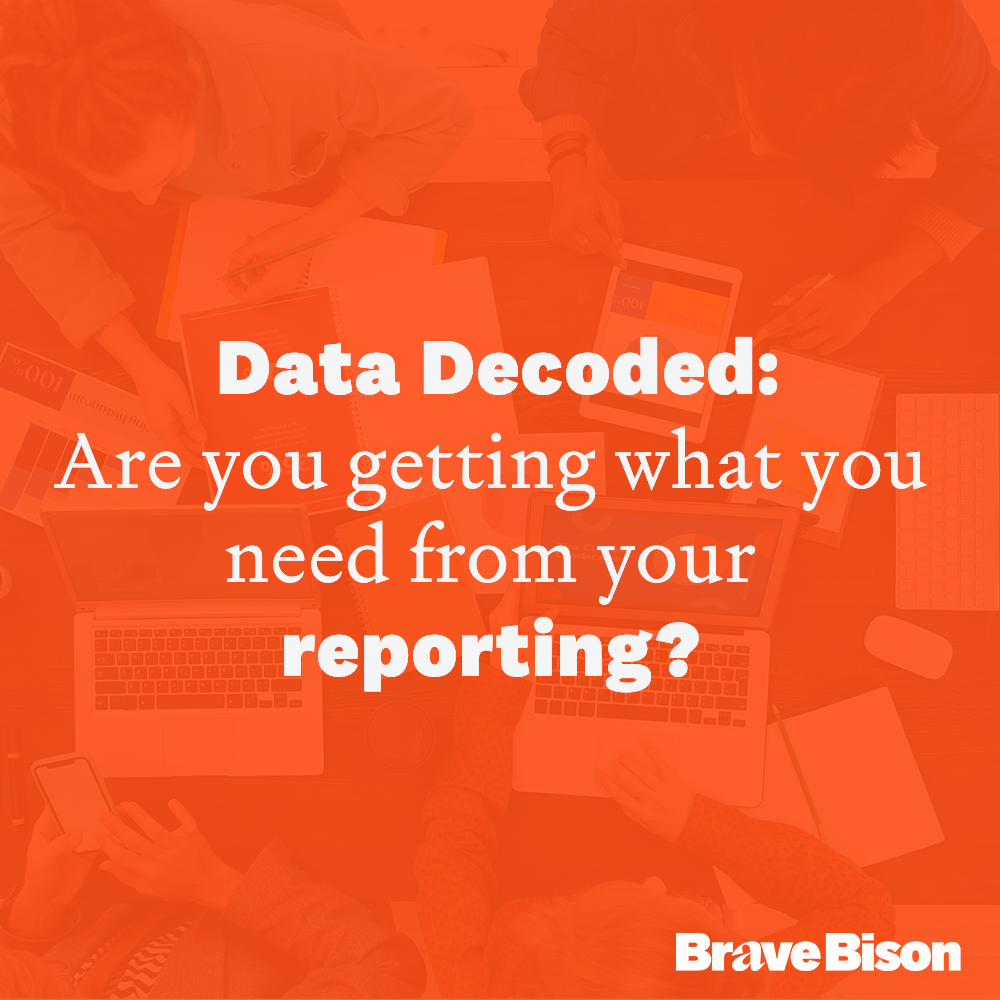
Are you getting what you need from your reporting?
July 2023
Brevity is the soul of wit (and also reporting)
With the launch of GA4, now is the perfect time to ask – what are you actually getting from reporting?
Change is scary. Despite the hundreds of LinkedIn posts welcoming it, I’d be concerned at any marketeer that didn’t admit to at least a modicum of fear around such a change in what has become a cornerstone of our industry.
But having worked in Client Services for half a decade, the fear factor of GA4 pales compared to anyone unable to answer the classic ancient question – what do you want your report to tell you?
I don’t mean what do you want it to say, because the default answer will be billions of users with an AOV of £100,000 each. What I mean, in the moment before you open your report, what question are you looking for it to answer? Of course, most of us will use a single report for multiple purposes, but consider – if you were in back-to-back Teams calls (impossible for most of us to imagine I’m sure), what one-line summary would you request from your Account Lead instead?
The age of over-information is alive and well within reporting
Let me ask a follow-up question – how do you take your reports? Are you a purist, preferring an Excel download, no doubt with a hefty lump of formatting? Perhaps you enjoy Search Ads 360s real-time Executive Reports? Or a sumptuous Google Ads Dashboard (with the still criminally underused ability to generate auction insights into graphs). Maybe all three, with a side of Analytics, built into a lengthy Looker Studio (formerly Google Data Studio)? Or could it be a more bespoke solution is preferred – Power BI, Prism by Brave Bison, Supermetrics, Lumar, Ad then? And your commentary, would that be presented weekly, sent via email, highlights via teams, or discussed on an archaic phone call?
The point, quite simply, is that we are all drowning in choices, all with separate pros and cons, and GA4, while important both due to the scope of its utilisation and the forced movement to more complex attribution models, is another one to add to the heap, even if it’s the very top of the pile.
So, what’s the point of this blog?
The message of this blog is to advise you, whether you’re a Brand or Agency, to take this opportunity to step back and think about what you need to know from your report. Fancy Google betas aside, it’s only ultimately possible to truly optimise to one KPI after all – start there and then work backwards, adding your additional KPIs and needs in layers until you hit precisely the level you need, and then stop dead. Don’t be tempted to build it out further – at this point, you could add and create metrics from now until the launch of GA5 (gulp) – simply build it, or have it built, until it meets your needs.
As the title says, brevity is the soul of wit. Another fitting idiom would be don’t let perfect be the enemy of good. If you’ll permit me to leave you with some parting tips:
Identify what you need to know, and at what frequency. It will always be tempting to build out a report, but consider keeping a weekly report lean, a monthly report a little fatter and a QBR all singing and dancing.
Consider having your reporting split out into “need to know” and “nice to have”. In the age of automation, it’s easy enough for your client services team to build out both – then you have a core report for when you need it, and the additional metrics for when you have time to take them in.
In the same vein, identify what is within your power to change and at what time scale Continuous reporting should lead to continuous improvement, either via brand growth, issue identification or whatever KPI is within your remit – otherwise what’s the point?
Consider adopting an OKR (Objective, Key Result) methodology. Set your objective and your success criteria, then work backwards to understand what metrics you need to see to inform this. When that’s ticked off, change the report frequency to however often you need to check in to ensure the problem stays fixed, then set your next objective and redefine what you need to see in your regular reports.
Be honest with your Client Services team!
Cutting to the heart of what you need will make your agency journey and relationship much smoother, happier, and more fulfilling. Work with them to iterate until your report is a finely honed machine.
Want to talk more about reporting or other brilliant basics?
If you want our help wading into the world of reporting solutions and making the complex simple, drop us a line.
